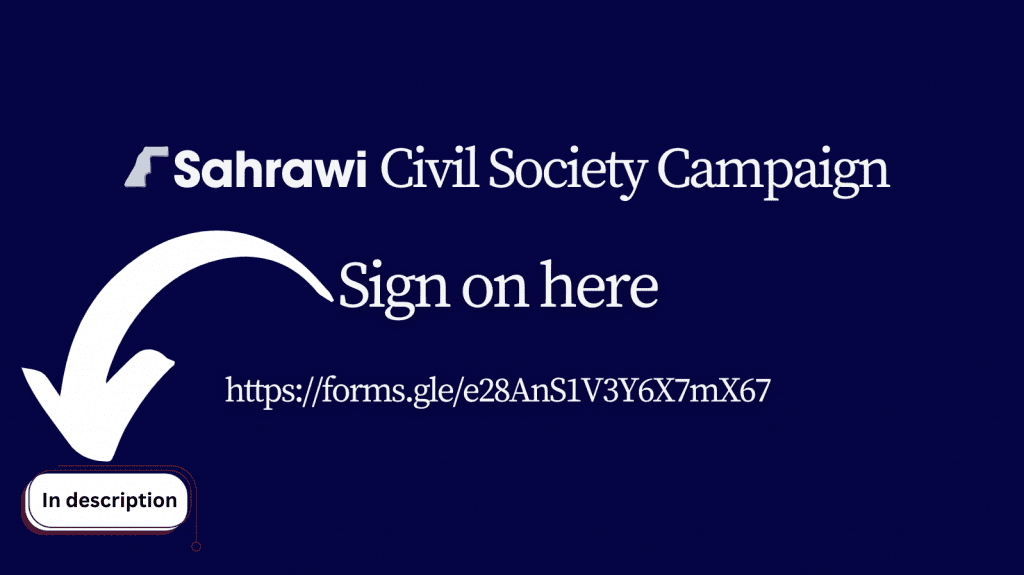Morocco’s appalling human rights record, including its colonial occupation of Western Sahara and its people, should exclude it from presiding the UN Human Rights Council, says Sahrawi civil society: “Allowing Rabat to hold the Council presidency is like putting the wolf in charge of the sheep.”
As Morocco vies to hold the one-year presidency of the UN Human Rights Council, which oversees thousands of human rights complaints from all over the world, civil society from Western Sahara is urging the Council to reject Rabat’s candidacy, pointing to Morocco’s deteriorating human rights record, occupation and colonization of their homeland, failure to cooperate with the UN mechanisms and its targeting and harassment of human rights defenders, journalists and others for their cooperation with the UN.
Morocco fundamentally fails to meet and uphold the human rights standard required for members of the Human Rights Council (ISHR, 2022). Since becoming a member in 2022, Morocco has stepped up its harassment of journalists and critics and continues to detain and subject journalists, bloggers, and human rights defenders to unfair trials. Freedom of the press is suffering a slow and deliberate death in the country, symbolized by the persecution and imprisonment of journalists and described in Human Rights Watch´s “They´ll Get You No Matter What: Morocco´s Playbook to Crush Dissent”. The Melilla disaster of June 2022 when at least 37 migrants died at the hands of Moroccan police at the border with Spain, also revealed the politization of migrant lives by the Moroccan state and according to UN experts, “the status quo of the European Union’s borders, namely racialized exclusion and deadly violence deployed to keep out people of African and Middle Eastern descent, and other non-white populations”, a concern echoed by Amnesty International.
The human rights and humanitarian crisis is even worse in the parts of Western Sahara placed under Moroccan occupation since 1975. Until this day, Morocco continues to deny the people of Western Sahara their right to self-determination; the very prerequisite and bedrock that all other human rights rest upon, openly defying UN Security Council resolutions that since the early 1990’s called for a referendum for the people of Western Sahara.
Moroccan authorities continue to harass activists supporting Sahrawi self-determination, prevent gatherings and obstruct the work of local human rights nongovernmental organizations (Human Rights Watch, 2023) with the territory being a practical “news black hole” (Reporters Without Borders). For the last eight years, the Office of the High Commissioner on Human Rights has been prevented access, and compounded by the systematic expulsion of international observers and denial of access for international organizations, the occupation is turning into a military human rights blackhole.
On Western Sahara, UN experts continue to denounce the systematic and calculated nature of violations committed by the Moroccan State, stating that the violations comprise a concentrated effort to intimidate and to deter human rights defenders in Western Sahara from exercising their rights to freedom of expression and association, and to retaliate against human rights defenders for their peaceful and legitimate activities, including membership in human rights organizations, information sharing, as well as dialogue with the UN. Morocco is also regularly included in the report of the UN Secretary General on reprisals (A/HRC/51/47), citing frequent acts of reprisals against activists who cooperate with the UN Office of the High Commissioner on Human Rights.
“A State attempting to obstruct dialogue with the UN, refusing to implement and follow recommendations from UN bodies and even publicly targeting UN experts, whilst punishing human rights defenders for their participation at the Human Rights Council, cannot be allowed to serve as its president. It will crush the very legitimacy that the Human Rights Council depends on to survive, leaving behind a people that has been placed under its occupation since 1975”, Saharawi civil society urges.
Sign on here
https://forms.gle/97KQLm2qEfArGoPm8
SIGNATURES:
- Equipe Media
- Saharawis Today
- La Ligue pour la protection des Prisonniers Sahraouis dans les prisons Marocaines (LPPS)
- Association for Natural Resources Monitoring and for Environment Protection in Western Sahara (AREN)
- Comité de Défense du Droit à l’Autodétermination du Peuple du Sahara Occidental (CODAPSO)
- Observatoire Saharaoui pour l’enfant et la Femme (OSEF)
- Comité Sahraoui contre la Torture à Dakhla
- Association Sahraouie des Victimes de Graves Violations des Droits de l’homme commises par l’état du Maroc (ASVDH)
- Freedomsun Defenders
- Sahrawi committee for the defense of human rights in Western Sahara
- Comité Sahraouie pour la défense de droit de l’homme smara Sahara occidental (csddhsso)
- L’association Sahraouie pour la Protection et la Diffusion de la Culture et le Patrimoine Sahroui
- Comité Sahraoui du droits de l’homme et pour la protection des ressources naturelles à Boujdour
- FAFESA (forum pour l’avenir de la femme Sahraouie)
- The Collective of Human Rights Defenders in Western Sahara (CODESA)
- Committee to support the United Nations settlement plan and the protection of Natural Resources in Western Sahara
- Comite saharaui de empleados y trabajadores expulsadas arbitrariamente por el estado marroquí
- Saharawi Voice
- Nushatta Foundation
- Lejse
- Juventud Activa Saharaui
- Comunidade Saharauí en Galicia
- COSARA
- Entre dunas
- Hijas del Sáhara
- UJSARIO
- Alimentando Sonrisas
- Saharawi Youth VS Occupation (SYVO)
- LPESE
- Red Ecosocial Saharaui
- Shifa
- Hijos de las nubes
- UNMS, Women
- UGTSARIO, Trade Union
- UESRIO, Students
- UPES, Saharawi journalists and writers
- AFAPREDESA
